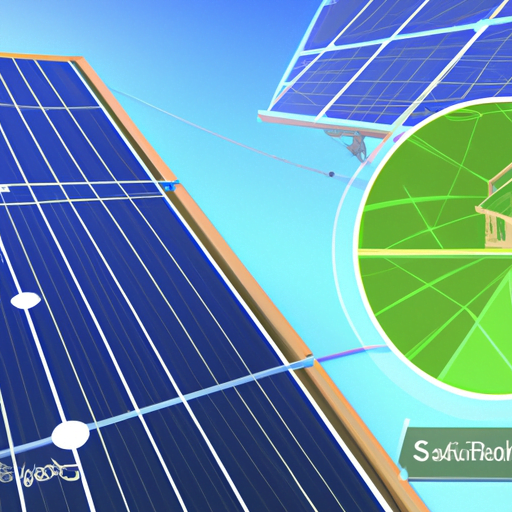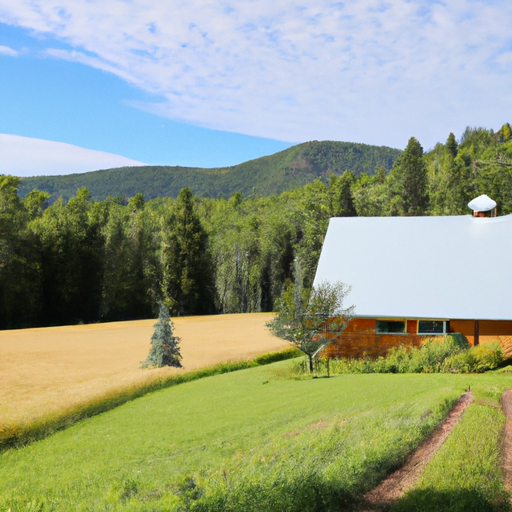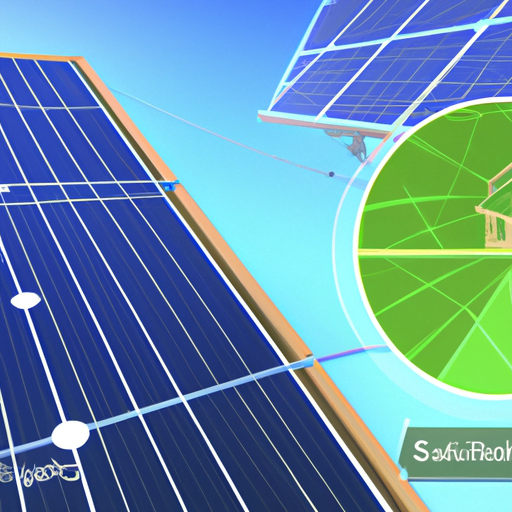Ever wondered what it would be like to live off the grid? You know, away from the hustle and bustle of the city, reliant on renewable energy, and embracing a more sustainable lifestyle. Well, in this article, we’re going to delve into the off-grid lifestyle and discover what it truly entails. So, if you’ve ever been curious about living off the grid, keep reading!
Living off the grid essentially means being self-sufficient and not relying on public utilities such as electricity, water, or sewage systems. It’s all about disconnecting from the traditional grid and finding alternative ways to meet your basic needs. This can involve generating your own power through solar panels or wind turbines, collecting rainwater for your water supply, and composting or using a septic tank for waste management. By living off the grid, you have the opportunity to reduce your carbon footprint and live a more sustainable lifestyle.
Intrigued? Well, in this article, we’ll be diving deeper into the off-grid experience. We’ll explore the challenges and rewards of living off the grid, discuss the different methods and systems that can be used, and provide tips for anyone interested in making the transition. So, whether you’re considering a complete off-grid lifestyle or just want to learn more about sustainable living, stay tuned for this informative article. Your journey into exploring the off-grid lifestyle starts here!

What is Off-Grid Lifestyle?
Definition of Off-Grid Lifestyle
The off-grid lifestyle refers to living without connection to public utilities such as electricity, water, and sewage systems. It involves relying on self-sustaining systems, renewable energy sources, and sustainable practices to meet daily needs. Essentially, it is a way of disconnecting from the conventional grid and embracing a more independent and self-reliant way of living.
The Concept of Disconnecting from the Grid
Disconnecting from the grid means breaking free from the dependence on centralized resources and embracing individual responsibility for meeting your own needs. It requires a shift in mindset and a willingness to explore alternative solutions, such as generating your own power through solar or wind energy, collecting and filtering rainwater, and implementing composting toilets. The off-grid lifestyle encourages a more sustainable and environmentally conscious way of living, promoting greater independence and reducing reliance on the traditional infrastructure.
Benefits of Off-Grid Living
Greater Independence and Self-Reliance
One of the primary benefits of the off-grid lifestyle is the sense of independence and self-reliance it offers. By disconnecting from the grid, you become more self-sufficient and less reliant on external sources for your basic needs. Generating your own power, harvesting water, and growing your own food empowers you to take control of your life and reduces the need to depend on public utilities or mass-produced goods.
Reduced Environmental Impact
Living off-grid has a significantly lower environmental impact compared to traditional lifestyles. By utilizing renewable energy sources like solar power and minimizing resource consumption, off-grid individuals actively contribute to reducing carbon emissions and preserving natural resources. The off-grid lifestyle aligns with principles of sustainability and eco-consciousness, ensuring a smaller carbon footprint and a healthier planet.
Financial Savings
One often overlooked benefit of embracing the off-grid lifestyle is the potential for financial savings. Investing in renewable energy systems like solar panels may require an initial investment, but in the long run, it can lower or eliminate monthly energy bills. Additionally, producing your own food, reducing water consumption, and implementing sustainable practices can result in significant savings. By reducing or eliminating monthly expenses, individuals living off-grid can allocate their resources towards other priorities, such as education, travel, or personal projects.
Essential Off-Grid Systems
Solar Power Systems
Solar power is one of the most popular and reliable sources of renewable energy for off-grid living. By harnessing the sun’s energy through photovoltaic panels, you can generate electricity to power your home. With advancements in technology, solar power systems have become more affordable and efficient, making them a practical choice for off-grid living. It provides a reliable source of energy while reducing dependence on fossil fuels and reducing your carbon footprint.
Water Harvesting and Filtration
Off-grid living often requires finding alternative sources of clean water. Rainwater harvesting is a common practice among off-grid individuals, which involves collecting rainwater and storing it for later use. Filtration systems are then used to remove any impurities, ensuring a safe and sustainable water source. This allows individuals to become less reliant on municipal water supplies or wells, and instead, harness the power of nature to meet their water needs.
Composting Toilets
Composting toilets are another essential system for off-grid living. These toilets use natural processes to break down waste into compost, which can be safely used as fertilizer for plants. Composting toilets not only reduce water usage but also eliminate the need for traditional sewage systems. They are eco-friendly and sustainable, providing a hygienic and decentralized solution for waste management.

Finding the Right Location
Consideration of Climate and Geography
When choosing an off-grid location, it is essential to consider the climate and geography of the area. Understanding the weather patterns, temperature ranges, and natural features can help determine the suitability for off-grid living. For instance, a sunny climate is ideal for solar power systems, while areas with sufficient rainfall are more conducive to rainwater harvesting. Evaluating these factors will ensure that your off-grid experience is optimized and sustainable.
Availability of Natural Resources
Access to natural resources is crucial for off-grid living. Consider the availability of renewable energy sources, such as sunlight or wind, which can be harnessed to generate power. Land with fertile soil and access to water sources is instrumental for food production. It is also important to assess the availability of building materials and other resources required for sustainable construction and maintenance. Evaluating these aspects will aid in choosing a location that aligns with your off-grid goals.
Access to Amenities
While off-grid living promotes self-sufficiency, it is also important to consider access to necessary amenities. Proximity to medical facilities, grocery stores, and other services can be essential, especially for emergencies or unexpected situations. Balancing the desire for seclusion and self-reliance with practicality will ensure a more sustainable off-grid lifestyle.
Building a Sustainable Home
Design Principles for Energy Efficiency
Designing an energy-efficient home is a crucial aspect of off-grid living. Utilize passive solar design principles, such as orienting your home to maximize sunlight exposure and incorporating insulation to minimize heat loss. Incorporate energy-efficient appliances, LED lighting, and smart home systems to further reduce energy consumption. By designing and constructing your home with energy efficiency in mind, you can minimize your reliance on external power sources.
Using Sustainable and Recycled Materials
Choosing sustainable and recycled materials for building your off-grid home is essential for reducing your environmental impact. Opt for locally sourced materials to minimize transportation emissions. Explore alternatives to traditional construction materials, such as bamboo flooring or reclaimed wood. Minimize waste by repurposing materials from previous construction projects. By using sustainable materials, you can create a home that is both eco-friendly and aesthetically pleasing.
Implementing Passive Heating and Cooling
Passive heating and cooling techniques can greatly contribute to energy efficiency in off-grid homes. Utilize natural ventilation, shading, and insulation to regulate indoor temperatures. Design spaces in your home to take advantage of natural airflow and sunlight. By implementing passive heating and cooling strategies, you can minimize the need for mechanical systems and reduce energy consumption.
Generating Off-Grid Income
Remote Work and Freelancing
Living off-grid does not necessarily mean disconnecting from work and income. Remote work and freelancing have become increasingly popular, allowing individuals to earn a living while embracing the off-grid lifestyle. With the advancement of technology, many professions can be carried out remotely, providing flexibility and the opportunity to work from anywhere. By leveraging your skills and expertise, you can generate income while enjoying the freedom and tranquility of off-grid living.
Eco-Tourism and Farm-to-Table Businesses
Off-grid locations often offer unique natural landscapes and a slower pace of life, making them attractive to eco-tourists. By capitalizing on the natural beauty and sustainable practices of your off-grid lifestyle, you can create an eco-tourism business. Additionally, participating in farm-to-table initiatives, organic farming, or producing value-added products can provide a source of income and contribute to the local economy. Embracing the local community and sharing the off-grid experience can be both fulfilling and financially rewarding.
Craftsmanship and Artistry
The off-grid lifestyle fosters creativity and self-sufficiency, making it conducive to craftsmanship and artistry. From woodworking and pottery to painting and jewelry making, there are numerous avenues for creative expression. By honing your skills and producing unique, handmade products, you can sell your creations online or through local markets. Embracing artisanal practices not only generates income but also adds to the diversity and vibrancy of the off-grid community.
Off-Grid Food Production
Permaculture and Organic Gardening
Off-grid living offers the opportunity to grow your own food, ensuring a constant supply of fresh and organic produce. Permaculture and organic gardening principles emphasize sustainable practices, such as companion planting, soil regeneration, and water conservation. By designing your garden to mimic natural ecosystems, you can create a self-sustaining system that requires minimal inputs and yields abundant harvests.
Aquaponics and Hydroponics
Aquaponics and hydroponics are innovative systems that allow for food production in limited spaces and with reduced water usage. Aquaponics combines aquaculture (fish farming) and hydroponics (soilless cultivation), creating a symbiotic relationship where plants are nourished by the nutrient-rich waste produced by the fish. Hydroponics, on the other hand, involves growing plants without soil, utilizing water and nutrient solutions. These systems can be implemented indoors or outdoors, allowing for year-round growth and a diverse range of crops.
Raising Livestock
For those seeking a greater degree of self-sufficiency, raising livestock can be a valuable addition to off-grid food production. Chickens, goats, rabbits, or pigs can provide meat, eggs, milk, and other animal products. Raising livestock requires careful consideration of space, food, and the well-being of the animals. However, it can offer a sustainable and ethical way of incorporating animal products into your off-grid lifestyle.
Challenges and Solutions
Limited Access to Resources
One of the challenges of off-grid living is the limited access to resources typically provided by public utilities. However, with careful planning and efficient use of resources, many of these challenges can be overcome. For example, conserving water through rainwater harvesting and implementing efficient water management practices can ensure a sustainable water supply. Utilizing renewable energy sources like solar power and implementing energy-saving practices can provide a reliable source of electricity. By embracing alternative solutions and practicing resourcefulness, off-grid individuals can mitigate the challenges associated with limited access to resources.
Maintenance and Repairs
Maintaining off-grid systems and infrastructure requires a certain level of technical knowledge and hands-on skills. Regular maintenance and occasional repairs may be necessary to ensure the proper functioning of renewable energy systems, water harvesting, and filtration systems, as well as composting toilets. Learning these skills or having access to a reliable local network of professionals can help address maintenance and repair challenges. Additionally, proactive monitoring and routine inspections can help detect and resolve issues before they become major problems.
Dealing with Isolation
Living off grid often involves a level of seclusion and isolation from urban areas and social networks. However, this challenge can be overcome by actively seeking community and building strong social connections. Engaging in local off-grid communities, participating in workshops or events, and maintaining regular communication with family and friends can help combat feelings of isolation. Embracing digital communication tools, such as video calls, can also help bridge the distance and keep connections alive.
Maintaining a Balanced Lifestyle
Connecting with Nature and Self
One of the fundamental aspects of the off-grid lifestyle is the opportunity to connect with nature and oneself. Spending time outdoors, immersing yourself in natural surroundings, and practicing mindfulness can provide a sense of peace and grounding. Engaging in activities like hiking, gardening, or wildlife observation can foster a deeper connection with the natural world and nurture personal well-being.
Community Building and Social Interactions
While off-grid living may involve a degree of isolation, community building and social interactions are essential for a balanced off-grid lifestyle. Actively engaging with the local off-grid community, participating in shared projects, and organizing gatherings or events can foster a sense of belonging and create a support network. Collaborative efforts and shared experiences can enhance the off-grid experience and provide opportunities for personal growth and meaningful connections.
Mindfulness and Wellness Practices
Living off grid allows for a slower pace of life, which in turn presents opportunities for mindfulness and wellness practices. Embracing activities such as yoga, meditation, and holistic therapies can support mental, emotional, and physical well-being. Cultivating a healthy and balanced lifestyle through nutritious eating, physical exercise, and self-care practices can promote overall wellness and enhance the off-grid experience.
Conclusion
Choosing an off-grid lifestyle is a conscious decision to live in harmony with nature and embrace self-sufficiency. By understanding the various aspects and systems involved, one can create an environmentally conscious and fulfilling off-grid experience. The benefits of greater independence, reduced environmental impact, and financial savings make off-grid living an attractive option for those seeking a simpler, more sustainable way of life. With the right location, sustainable home design, and income-generating initiatives, off-grid living can provide a fulfilling and rewarding journey of exploration and self-discovery.




